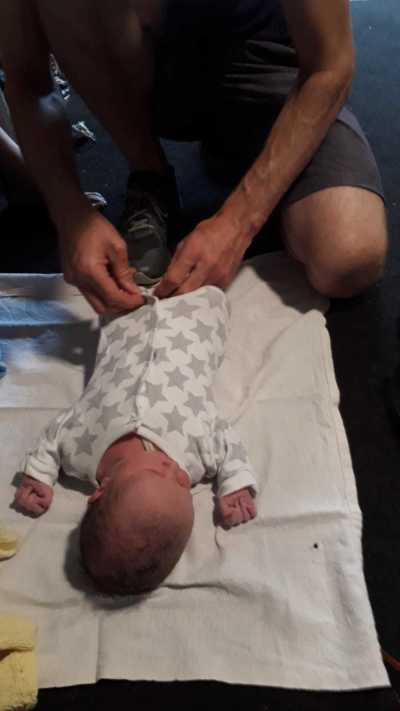
I was waiting at the airport with my five-year old son. We were meeting his Dad, returning from a visit to his elderly father in another city. The passengers streamed through, then there was a gap. “There he is!” exclaimed Paul, immediately running towards his Dad, and jumping straight into his arms. Fortunately, his father was able to drop his brief case and catch his son, who immediately planted kisses all over his head. An older couple nearby smiled with delight, as they watched this heart-felt reunion.
When our son was growing up it was obvious how important his Dad was in his life. He was important to our daughters too, and notably for our youngest, who when she became a teenager, was no longer a ‘Mummy’s girl’, but had switched her focus to her Dad. I’m enormously grateful that our children had a hands-on Dad, who was there for them (and still is, though naturally in a less involved way).
I’m grateful too to see that our sons-in-law are also focused on being hands-on in their parenting. They are fully involved and aware of the influence they have in their children’s lives. One of our grand-daughters, when she was two would go through each of her books with me, pointing out who the characters were on each page. She would point her finger saying, ‘That’s the Mummy,’ ‘That’s the Daddy,’ ‘That’s the baby.’ (or the sister, or the brother, etc…) Before we read the story, we had to establish the connections, and who each one was in relation to the other. It would have been incomprehensible to her, to think that a family wouldn’t have a mummy, or wouldn’t have a daddy.
The value of fathers
Recent research has reinforced the value that fathers have in the lives of their children. In an age where the focus is on the rights of potential parents to have children, the rights of a child take second place. Yet, wherever possible, it is of the utmost importance that children have a mother and a father who bring them up.
Some women are choosing to have children and bring them up on their own, without regular input from the child’s father. An article may show a happy mother with her child, who was born after the mother used a donor. (Rarely is there any focus on the child as a teenager or an adult, and how they view their experience of being denied having a father in their lives.) Increasing numbers of young adults are wanting to research who their father is – and recently one young photographer in the US documented in photographic portraits over 20 of his half siblings. All these people had had the same sperm donor as a father.
The latest research underlines the need for every child to have and know and experience having a father. People need more than to know through DNA who their father is. They need to know the love of a father.
When parents split
Divorced parents so often share custody, which means each child has less of each parent, and also doesn’t get to experience very often (if at all) the dynamics of all being together, and of having role models of a mother and a father relating to each other. Even if a divorce is amicable, and the parents work really hard to provide their children with a loving, supportive upbringing, children do still have the experience of being split down the middle – obviously, because they belong to each parent.
Frequently it’s the mother who has the main share of the custody (though there are devoted fathers who do also) and the children have the experience of being shuttled from one parent to the other.
No matter how caring or supporting same-sex parents can be of their children, they are still depriving a child of the context of the daily interactions of a mother and father, and the absent parent if more than a surrogate or donor, usually has only limited contact. It’s very natural to desire having a child – it can be an aching and heart-felt need for many. But the rights of a child must still prevail.
What about when there is no father?
I remember the heart-ache experienced by the son of a solo mother. She told me how on Father’s Day, when her boy was about eight, he sat for a long time, sobbing and sobbing, because he didn’t have a father. His mother asked me what she could do? I replied that although she was doing the best she could, there was no way she could make up for the loss of a father. She couldn’t be both parents. Her son’s grief was something she could not compensate for.
There can be many reasons why children grow up without a father. One lovely older woman I met, told how her father had died when she was six. “I learned to trust God as my Father,” she said. (She had obviously already learned to trust her human father.)
Some children have bad experiences of their fathers, and find it very difficult to trust God as Father. Some learn to trust God in other ways; others find counselling and prayer can lead to a healing in their relationship with God.
Or no chance of having children?
Before there was such a thing as fertility treatment, people had to learn to live with the loss of being child-less. How they adjusted to that loss spoke volumes about their character. In the days of large families, there were always nieces and nephews to be involved with. One friend I had, who would have made a wonderful mother, never had the opportunity to marry. She gravitated naturally to children, and became the godmother of six. Her support and care for these children, including when as adults they had children of their own, was beautiful to see.
I listened to one young man describe how although he was same-sex attracted, he had chosen to live a celibate life, but also knew that he needed nourishing human relationships to help him do that. He spent time with families, and nurtured relationships with children, and with both sexes. Although it was challenging, he drew on his faith, his family and honest and supportive friends in his network.
Befriending children
When there is no father, then uncles, grandfathers, and family friends, can have significant input into the lives of growing children. So can sport coaches, and other men who invest in and spend time one-to-one with children. One primary school had so many children without fathers, a programme was developed whereby men would give up their lunch hours and come spend time with the boys, one-to-one. (Of course, proper vetting of the men was needed.)
One young lad had lost his father. His teacher, a rather shy man, had started a chess club after school, and took an interest in the fatherless boy, who was an only child. They developed a strong friendship, which the boy’s mother deeply appreciated. In time, she too developed a strong relationship with her boy’s teacher, and the pair eventually married, thereby providing the boy with a father.
There’s good reasons why Jesus called God, ‘Abba’ (Father). It’s to show the intimate, personal, loving care of a Father for his children that God has for us. We can begin to understand this through having experienced the love of a human father. Children need, deserve, and thrive when they have the attention, love and guidance of their fathers. Why would anyone deny a child this opportunity, deliberately?

Liz Hay rejoices in living in a beautiful part of God’s creation in a high country mountain basin; and she also rejoices in hearing stories of God at work in people’s lives. One of her favourite activities is reading fascinating biographies that illustrate the wonderful ways God works uniquely with each person.